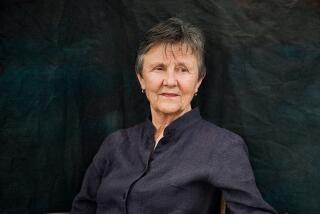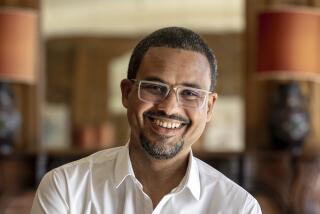OBITUARIES : Marguerite Yourcenar; 1st Woman ‘Immortelle’ in Academie Francaise
- Share via
Marguerite Yourcenar, who lived in Maine, wrote in French and ended 3 1/2 centuries of misogyny when she became the first woman acclaimed an immortelle by the prestigious Academie Francaise, is dead.
The internationally esteemed historical novelist was 84 when she died Thursday night after suffering a stroke last month. She died in a hospital in Bar Harbor, Me., near her small home of white timber on Mount Desert Island where she was known to neighbors simply as “Madame.” She will be cremated and her ashes buried there, a spokesman for her French publisher said.
Little known to the English speaking world until her 1980 admission to the 40-member Academie Francaise--which guards the French language from impurities--Ms. Yourcenar was considered a master of psychological analysis of history through her novels, which were set at disparate points of time and in diverse cultures.
Probably known best for her 1951 novel “The Memoirs of Hadrian,” about the Roman emperor, and “L’Oeuvre au Noir,” (The Abyss) about Europe in the 16th Century, Ms. Yourcenar was hailed by critics for her ability to remove herself from her subjects and for her evocations of the past that illuminate the present.
“French letters has just lost an exceptional woman,” Premier Jacques Chirac said in Paris. “On the strength of a classical and rigorous style, Marguerite Yourcenar used a very personal tone to find, thanks to history, the occasion for a strong reflection on morality and power.”
President Francois Mitterrand called her “one of the great writers of this century and issued a statement saying that “she gave us lessons of nobility, of conscience, and also of the appetite for life.”
2nd American Nominated
Jean d’Ormesson, the French writer and editor who nominated the silver-haired, soft-spoken author as a fellow member of the academie, said that after Jean-Paul Sartre and poet Louis Aragon, Ms. Yourcenar was the best representative of French literature in the world.
It was his nomination that sparked a furor in France not only because the choice was a woman but also because she was a citizen of both France and the United States.
She also was only the second American, after author Julien Green, who was born of American parents in Paris, to be considered for membership. (He obtained French nationality before his election in 1971.)
Surprisingly Ms. Yourcenar was elected by a 20-12 margin on the first ballot even after warning the academie that she would accept membership but would not wear the traditional gold-embroidered uniform nor carry a sword at her inaugural.
And in taking her seat, she paid tribute to the “invisible troop of women that perhaps should have received this honor sooner.”
Although she said she was pleased at the distinction, she lent little personal credence to her selection, once describing the academie as “a club of elderly gentlemen.”
Born in Belgium
Marguerite Yourcenar was born Marguerite de Crayencour in Brussels, Belgium, to an old, established society family. She was the only child of a French father and a Belgian mother, who died 10 days after her birth.
Ms. Yourcenar was raised by her father, Michel, a nobleman known for his romantic adventures and the first two volumes of her three-volume autobiography dealt with her maternal and paternal lineage.
Her father supervised her education, obtained exclusively at home through a governess and tutors who taught her to read aloud in many languages.
By age 8 she was fluent in the classics, was accomplished in Latin by the age of 10 and Greek at 12.
Her father, whom Ms. Yourcenar once called “the first great friend I ever had and the freest man I ever knew,” paid for the publication of a book of poems which she signed Marguerite Yourcenar--a near-anagram of Crayencour. She was 10.
She traveled with her father to England during World War I and then after his death in 1927 throughout Europe and the eastern Mediterranean.
Small Readership
Her first novel, “Alexis,” was published in 1929. Over the years her work ranged from descriptive scenes of her childhood to a novel centered on attempts to assassinate Benito Mussolini.
Robert Nunn, associate professor of romance languages at Bowdoin College in Brunswick, Me. where her manuscripts and original editions will be kept, said Ms. Yourcenar had a small readership because her works were so difficult.
“They require a great deal of knowledge of history.
Ms. Yourcenar first visited the United States in 1937 to do research at the Yale University library and decided to stay. In 1947, she became an American citizen but failed to notify French officials that she wanted to preserve her French citizenship, which she later lost.
That almost cost her her seat in the Academie Francaise, which agreed to postpone the vote so she could be reinstated as French which she managed only months before her nomination.
Her decision to stay in the United States had been prompted by the outbreak of World War II and her close friendship with American Grace Frick, a teacher who became her prime translator.
Translator of Spirituals
During the war she lectured and taught art history at Sarah Lawrence College in New York while translating Virginia Woolf’s “The Waves” and Henry James’ “What Maisie Knew.” Both volumes were praised for overcoming stylistic difficulties.
The success of “The Memoirs of Hadrian” in which she tried to define the character of the Roman emperor, overcame her financial difficulties and permitted her to concentrate on her novels. Although they were warmly received and impactful in France, only three had been translated into English before her nomination to the Academie Francaise.
An eclectic reader and writer, she translated into French many of the Negro spirituals she had heard while traveling the American South while performing a similar service for erudite Greek and Latin poets.
“I try to give an idea, an emotion, as close as I can to what the author wanted to be felt by the reader,” the never-married writer once said of her translating talent.
She also studied and wrote on art, mythology, philosophy and genealogy, prompting the noted French literary critic Jacqueline Piatier to call her “an unabashed humanist with old-fashioned values.”
And her deeds matched her words as she lent support from her French country cottage in rugged Maine to things ecological, saying that today’s primary concern should be what humanity leaves for tomorrow.
More to Read
Sign up for our Book Club newsletter
Get the latest news, events and more from the Los Angeles Times Book Club, and help us get L.A. reading and talking.
You may occasionally receive promotional content from the Los Angeles Times.









